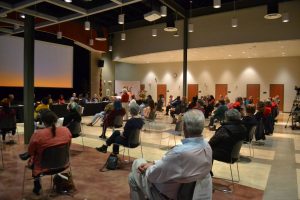
NEWARK – Concerns about book banning dominated a school board meeting this week.
Dozens of citizens attended Tuesday’s Worcester County Board of Education meeting to share various concerns, the majority of which related to a library book under review. Though two community members asked the school system to review inclusion of the book “All Boys Aren’t Blue” in high school libraries, most citizens at Tuesday’s meeting objected to any books being pulled from shelves.
“Restricting access to queer education and resources will not rid the Eastern Shore of LGTBQ youth,” said Berlin resident Allison Barton. “Instead, removing queer narratives from vital places of learning will promote the idea that these stories and the characters in them are less valuable than their white, heteronormative counterparts.”
After people shared explicit passages from “All Boys Aren’t Blue”—a memoir of “growing up Black and queer in America”—at a recent meeting, the school system received two requests for review of the item. Both asked that it be removed from library shelves. At Tuesday’s school board meeting—one of the first to be held in the evening—numerous parents and community members said they didn’t want to see any books removed from school libraries. Parent Amy Gooding said checking out a library book was a choice.
“Trust your children, you have raised them,” she said.
Cass Dasher, a Salisbury resident who works in libraries, told the board that the book had been widely praised by various literary critics.
“If we were to remove every book that had something to offend someone from our school libraries, there would be no books left on the shelves,” Dasher said.
Raquel Ndirangu, a Pocomoke High School student and school board representative, said students currently had the freedom to choose what they wanted to read in school libraries and taking that freedom away would do a grave disservice.
“Having different works of literature that represent all walks of life is important to us,” she said. “It gives us a chance to see a more realistic view than what’s been pushed in the past.”
Angela Manos, parent of a Stephen Decatur Middle School student, read what she called a salacious passage from the Bible.
“My point in sharing this is to demonstrate how misleading and dangerous it can be to take text out of context from a book,” she said.
She said the attacks on the book were part of a political agenda. Her husband shared experiences they’d had with their daughter after she told them she was gay.
“She’s been told to kill herself on three separate occasions in your school system…,” Matthew Manos said. “She’s coming home demoralized. She’s begging us not to go to school so she doesn’t have to deal with this. It’s not just her, it’s her and all her friends.”
He said the school system’s first responsibility was to provide a safe learning environment.
“We’ve got bigger issues than removing a book off the shelves because some people don’t agree with it,” he said.
Bishopville resident Richard Addis shared concerns about the fact that local students were graduating from Worcester County’s public schools and needing remedial education at the college level. He said that in spite of that the public seemed to be focused on one particular book.
“If this book is that much of a controversial issue, remove it,” he said. “Obviously it’s creating problems and distracting people, distracting our educators, distracting our kids, from the core subjects they are here to learn. This is a school. This is not a social justice league. Kids are here to learn math, science, reading, writing. That’s what they are here to do.”
Retired teacher Gwen Lehman said school librarians were dedicated to their roles in schools and worked to ensure books represented all students.
“Selectively removing materials that have been properly vetted by professional staff undercuts efforts by all those who work in schools to acknowledge, to value and to represent all children,” she said.
Sharnell Tull, a poet who grew up in Pocomoke, talked about literature that had inspired her and said students needed access to books that they saw themselves in.
“To ban is to hold back,” she said. “To hold back is to deny and to deny is to limit and to limit with a banned book is ultimately to oppress.”
Parent Kate McCloskey, who submitted one of the requests that the book be reviewed, said it wasn’t about banning books but was about keeping age inappropriate material out of kids’ hands.
“It breaks my heart that they can walk into a school library and check out a triple-X material book,” she said. “They can’t go to an R-rated movie if they’re under 18 but in our school system there are triple-X rated books. It’s not about banning it’s about keeping the health, the mental health of our children, keeping it a safe environment.”
She said she’d been upset by the email she received from the school system Tuesday advising her that a school committee had reviewed the book and recommended it stay on the shelves.
“I wanted to cry, throw up….,” she said. “You’re gatekeepers. I hope I don’t care more about our schools and our kids than you do.”
McCloskey said the book had been removed from other school libraries.
“There are plenty of parents I’m standing for that are afraid to come because they’re afraid their kids will be bullied by standing up,” she said.

